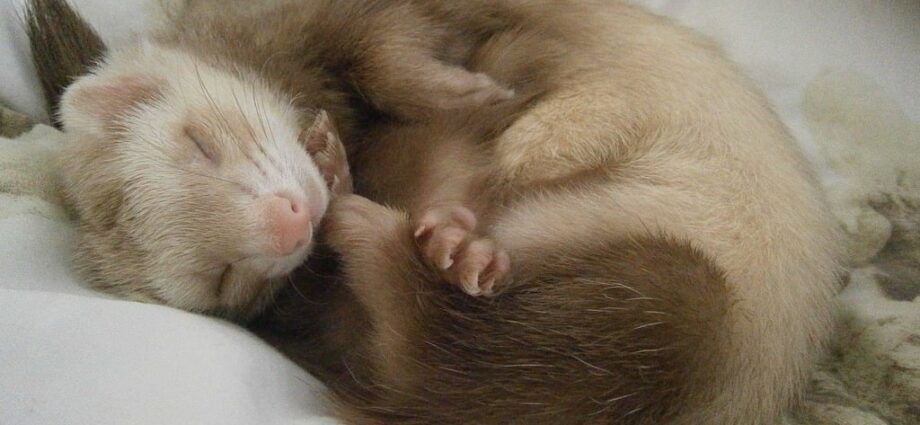Loose stools in young ferrets can be concerning, as they might indicate dietary issues, stress, illness, or parasites. Here are some steps to control and address the problem effectively: 🩺🐾
1. Assess the Diet
A proper diet is crucial for healthy digestion in ferrets.
- High-Protein, Low-Carb Diet: Ensure your ferret is eating a diet with at least 30–40% high-quality animal protein and 15–20% fat. Avoid sugary or carb-heavy foods as they can upset their stomach.
- Recommended foods: High-quality ferret kibble or a raw diet (approved by a vet).
- Avoid: Fruits, vegetables, grains, or dairy.
- Introduce New Foods Slowly: If you’ve recently changed their diet, switch back to the previous food and reintroduce new foods gradually to prevent stomach upset.
2. Provide Fresh Water
Dehydration from diarrhea can quickly become dangerous for young ferrets.
- Always ensure they have access to fresh, clean water.
- You can also offer electrolyte solutions (like Pedialyte) in small amounts to prevent dehydration. Mix it 50/50 with water.
3. Rule Out Stress
Stress from changes in their environment, handling, or new companions can upset their digestion.
- Keep their habitat calm and consistent.
- Limit exposure to loud noises and excessive handling until they stabilize.
4. Parasite and Illness Check
Parasites and illnesses are common causes of loose stools in young ferrets.
- Signs to watch for:
- Persistent diarrhea lasting more than 24–48 hours.
- Blood or mucus in stool.
- Lethargy or loss of appetite.
- What to do: Collect a stool sample and visit a vet for testing. Common issues include:
- Eosinophilic gastroenteritis (EGE): A condition causing inflammation.
- Parasites: Like coccidia or giardia.
- Bacterial infections: Such as Helicobacter or E. coli.
5. Probiotics and Supplements
Probiotics can help restore gut balance.
- Probiotics: Add a ferret-safe probiotic (consult with your vet for the correct type and dosage).
- Pumpkin Puree (Optional): Pure, unsweetened pumpkin (1/2 teaspoon) can help firm stools.
6. Clean Their Environment
Sanitation is critical to prevent reinfection or spreading of pathogens.
- Clean their litter box daily.
- Use ferret-safe disinfectants to sanitize their cage, bedding, and toys.
7. Monitor Closely
Observe their behavior and stool for any changes.
- Improvement: If stools begin to firm up within 24–48 hours, continue monitoring their diet and hydration.
- No Improvement: Seek veterinary care immediately. Young ferrets can deteriorate quickly.
Ferret-Safe Probiotics and Care Plan
Here’s a quick guide to ferret-safe probiotics and a basic care plan to address loose stools:
Ferret-Safe Probiotics 🦠
Adding probiotics can support healthy gut flora and aid digestion.
- Bene-Bac Plus: A probiotic gel or powder designed for small animals. Dosage: Follow packaging instructions based on weight.
- FortiFlora for Cats: Often recommended for ferrets (consult your vet for dosage).
- Acidophilus Supplements: Look for ferret-safe options in pet stores or vet clinics.
💡 Always consult your vet before introducing any new supplement to ensure safety and proper dosing.
Basic Care Plan
- Immediate Steps
- Temporarily limit their diet to ensure simplicity (high-quality kibble or raw food).
- Provide fresh water and electrolyte solution (if signs of dehydration are present).
- Monitoring
- Observe stools for changes in texture and color.
- Note any changes in behavior, like lethargy or reduced appetite.
- Environment Management
- Keep their habitat clean and stress-free.
- Wash their bedding and disinfect litter boxes regularly.
- Follow-Up Care
- Gradually reintroduce variety in their diet after stools normalize.
- Schedule a vet appointment if symptoms persist beyond 48 hours or worsen.
When to See the Vet
👉 If diarrhea persists beyond 24–48 hours, or if they exhibit signs of dehydration, lethargy, or loss of appetite, take your ferret to the vet immediately.

